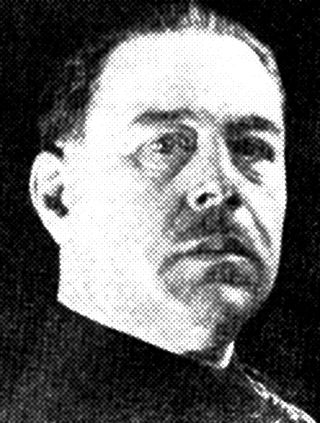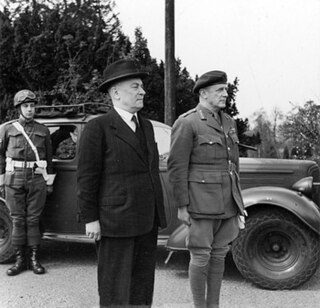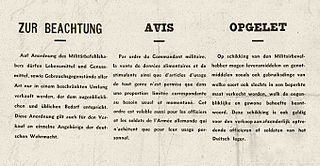
Henri (Hendrik) de Man was a Belgian politician and leader of the Belgian Labour Party (POB-BWP). He was one of the leading socialist theoreticians of his period and, during the German occupation of Belgium during World War II, played a limited role in collaboration.

Léon Joseph Marie Ignace Degrelle was a Belgian Walloon politician and Nazi collaborator. He rose to prominence in Belgium in the 1930s as the leader of the Rexist Party (Rex). During the German occupation of Belgium during World War II, he enlisted in the German army and fought in the Walloon Legion on the Eastern Front. After the collapse of the Nazi regime, Degrelle escaped and went into exile in Francoist Spain, where he remained a prominent figure in neo-Nazi politics.
Franz Handlos was a German right-wing politician.

Eupen-Malmedy is a small, predominantly German-speaking region in eastern Belgium. It consists of three administrative cantons around the towns of Eupen, Malmedy, and Sankt Vith which encompass some 730 square kilometres (280 sq mi). Elsewhere in Belgium, the region is commonly referred to as the East Cantons.

Achille Van Acker was a Belgian politician who served three terms as the prime minister of Belgium between 1946 and 1958. A moderate from Flanders, Van Acker was a member of the Belgian Socialist Party (PSB–BSP) and played an important role in the creation of the Belgian welfare state after World War II.
Émile Krieps was a Luxembourgish resistance leader, soldier, and politician. A member of the Democratic Party, Krieps served in cabinets under Pierre Werner and Gaston Thorn.

Pierre Daye was a Belgian journalist and Nazi collaborator. As supporter of the Rexist Party, Daye exiled himself to Juan Peron's Argentina after World War II.

The Belgian Labour Party was the first major socialist party in Belgium. Founded in 1885, the party was officially disbanded in 1940 and superseded by the Belgian Socialist Party in 1945.

The Military Administration in Belgium and Northern France was an interim occupation authority established during the Second World War by Nazi Germany that included present-day Belgium and the French departments of Nord and Pas-de-Calais. The administration was also responsible for governing the zone interdite, a narrow strip of territory running along the French northern and eastern borders. It remained in existence until July 1944. Plans to transfer Belgium from the military administration to a civilian administration were promoted by the SS, and Hitler had been ready to do so until Autumn 1942, when he put off the plans for what was intended to be temporary but ended up being permanent until the end of German occupation. The SS had suggested either Josef Terboven or Ernst Kaltenbrunner as the Reich Commissioner of the civilian administration.

Paul Hoornaert was a Belgian far right political activist. Although a pioneer of fascism in the country he was an opponent of German Nazism and, after joining the Belgian Resistance during the German occupation, died in Nazi custody.

The Belgian Government in London, also known as the Pierlot IV Government, was the government in exile of Belgium between October 1940 and September 1944 during World War II. The government was tripartite, involving ministers from the Catholic, Liberal and Labour Parties. After the invasion of Belgium by Nazi Germany in May 1940, the Belgian government, under Prime Minister Hubert Pierlot, fled first to Bordeaux in France and then to London, where it established itself as the only legitimate representation of Belgium to the Allies.
Kunstschutz is the German term for the principle of preserving cultural heritage and artworks during armed conflict, especially during the First and Second World Wars, with the stated aim of protecting the enemy's art and returning after the end of hostilities. It is associated with the image of the "art officer" (Kunstoffizier) or "art expert" (Kunstsachverständiger).

Despite being neutral at the start of World War II, Belgium and its colonial possessions found themselves at war after the country was invaded by German forces on 10 May 1940. After 18 days of fighting in which Belgian forces were pushed back into a small pocket in the north-west of the country, the Belgian military surrendered to the Germans, beginning an occupation that would endure until 1944. The surrender of 28 May was ordered by King Leopold III without the consultation of his government and sparked a political crisis after the war. Despite the capitulation, many Belgians managed to escape to the United Kingdom where they formed a government and army-in-exile on the Allied side.

The French National-Collectivist Party, originally known as the French National Communist Party, was a minor political group active in the French Third Republic and reestablished in occupied France. Its leader in both incarnations was the sports journalist Pierre Clémenti. It espoused a "national communist" platform noted for its similarities with fascism, and popularized racial antisemitism. The group was also noted for its agitation in support of pan-European nationalism and rattachism, maintaining contacts in both Nazi Germany and Wallonia.

The Committee of Secretaries-General was a committee of senior civil servants and technocrats in German-occupied Belgium during World War II. It was formed shortly before the occupation to oversee the continued functioning of the civil service and state bureaucracy independently of the German military occupation administration.

The German occupation of Belgium during World War II began on 28 May 1940, when the Belgian army surrendered to German forces, and lasted until Belgium's liberation by the Western Allies between September 1944 and February 1945. It was the second time in less than thirty years that Germany had occupied Belgium.

The Strike of the 100,000 was an 8-day strike in German-occupied Belgium that took place from 10 to 18 May 1941. It was led by Julien Lahaut, head of the Belgian Communist Party even though the Molotov–Ribbentrop Pact was still in force. The object of the strike was to demand a wage increase, but it was also an act of passive resistance to the German occupation.
When Luxembourg was invaded and annexed by Nazi Germany in 1940, a national consciousness started to emerge. From 1941 onwards, the first resistance groups formed in secret, operating underground and in defiance of the German occupation. Their covert activities included aiding political refugees and those evading conscription into the German forces, as well as disseminating patriotic leaflets to bolster the Luxembourgish population's spirits.

During World War II, Belgian prisoners of war were principally Belgian soldiers captured by the Germans during and shortly after the Battle of Belgium in May 1940.
Groupe Mémoire - Groep Herinnering (GM-GH) is a Belgian association set up in memory of the Belgian political prisoners of the Second World War.